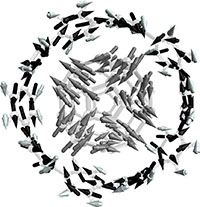 Quantum mechanics is the fundamental theory of fields and matter and it is arguably the most successful and widely applicable theory in the history of physics. Quantum mechanics is widely used today to describe low and high energy phenomena. This includes studying molecules and solids throughout biology, chemistry and physics, and even the determination of constitutive relations in engineered mesoscale structures.
Quantum mechanics is the fundamental theory of fields and matter and it is arguably the most successful and widely applicable theory in the history of physics. Quantum mechanics is widely used today to describe low and high energy phenomena. This includes studying molecules and solids throughout biology, chemistry and physics, and even the determination of constitutive relations in engineered mesoscale structures.
The aim of this program is to pave the way towards practical and error-controlled quantum-mechanical calculations with tens of thousands (or even millions) of quantum particles. This IPAM program is based on the premise that by systematically analyzing the structure and topology of Hilbert spaces of different systems and methods, as an interdisciplinary community we can overcome the bottlenecks of existing approximations, and move towards quantum multiscale methods based on Hilbert space embedding, model order reduction, and complementary mathematical and statistical techniques. This program will bring together physicists, mathematicians, chemists, engineers, and computer scientists interested in pushing the boundaries of theory and methods based on quantum mechanics.
Eric Cances
(École Nationale des Ponts-et-Chaussées)
Maria J. Esteban
(CNRS and Université Paris-Dauphine)
Giulia Galli
(University of Chicago)
Lin Lin
(University of California, Berkeley (UC Berkeley))
Alejandro Rodriguez
(Princeton University)
Alexandre Tkatchenko
(University of Luxembourg)